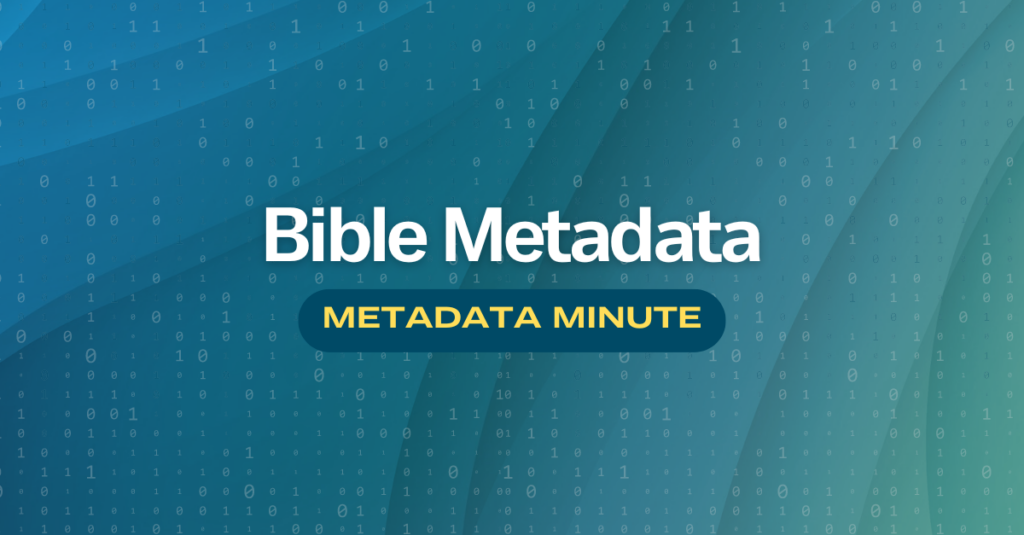
Metadata Minute (Issue #12): Bible Metadata
Unlocking the full potential of Bible publications involves understanding their unique metadata needs. While there are similarities with other types of books, key metadata differences can enhance their sales and visibility. Here are some Bible metadata suggestions for you to consider:
For Title Management and Eloquence on Demand Users: For publishers using Title Management Enterprise, Title Management Lite, or Eloquence on Demand, the Bible Details section on the Title Summary window allows Bible publishers to more accurately define the contents and format of Bibles in their metadata feed. This metadata is primarily utilized by Amazon and includes many specific Bible metadata, including: audience, purpose, translation, format, columns of text, and additional features (see below). If you have never used these fields before, please be sure to reach out to the Support team to ensure they are configured to be sent in the appropriate metadata feeds.
Additional Features: Oftentimes, Bibles come with additional features that other books don’t have. It’s always good to call out these additional features within your metadata. These features can include: gilded edge, magnetic flap, maps and charts, red letter, ribbon marker, thumb index, wide margin, and zipper.
Edition and Translation: Be sure your metadata accurately specifies the edition / translation of the Bible. Clarifying the version of your Bibles, such as King James, New International, and English Standard, is critical when it comes to categorizing Christian Bibles and allows readers to easily locate the exact version they’re searching for.
Study Features:If the Bible includes additional study features such as commentary or maps, be sure to include these in the book description. Such features can be helpful for readers seeking deeper understanding or specific study aids.
Format and Binding:Specify the format and binding of the Bible, whether it’s a hardcover, leather-bound, paperback, digital, and/or large print. This information is valuable for readers who have preferences for durability, portability, and readability.
Interactive Elements: If the Bible includes interactive features such as digital links to supplementary resources, QR codes for additional content, customizable study plans, or other interactive elements, be sure to include those in your description.
Keywords: Consider including keywords related to:
- Bible Version: While the title field normally contains the version name and often the acronym, it might be helpful to include other more specific version details in your keywords (and in your description). For example, King James 1611, NASB 1995, etc.. If it is catered towards a specific type of reader, such as a Study Bible or Children’s Bible, that might also be good information to add into the keywords
- Targeted Denomination:If your book is catered towards a specific group, such as Catholic, Protestant, or Jewish, be sure to include those in your keywords.
- Study Tools and Resources:Be sure to include if your Bible contains commentary, maps, devotionals, etc.
- Audience: Is this Bible designed for pastors, scholars, children, teenagers, or general readers.
Enhance the visibility and success of your Bible publications by following these guidelines. To dive deeper into Bible metadata and optimize your listings, consider taking Joshua’s Learning Metadata for Book Publishing Online Class! Subscribe to the Metadata Minute for more monthly metadata tips.
The Metadata Minute is your monthly guide to boosting book sales and visibility by mastering metadata elements! Whether you’re an author, publisher, marketer, or industry enthusiast, “Metadata Minute” has something to offer everyone.
🔍What to expect:
- Insights from industry experts
- Tips and techniques to perfect your metadata for backlist & frontlist titles
- The latest industry trends in metadata practices, ensuring you’re always one step ahead
- Case studies proving the power of metadata transformations
Subscribe today to receive the “Metadata Minute” newsletter on the last Monday of each month. If you missed it, they will also be included in our monthly Firebrand Newsletter, sent straight to your inbox.
